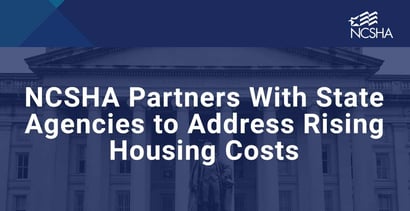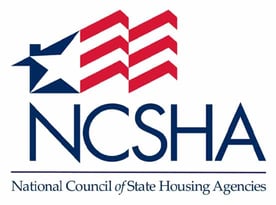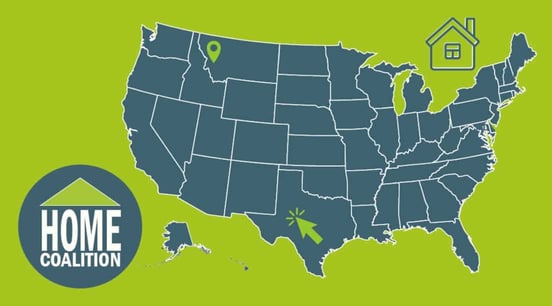
In a Nutshell: State housing finance agencies (HFAs) provide a collective $45 billion in financing to assist more than 300,000 households annually. The National Council of State Housing Agencies (NCSHA) works at the federal level on their behalf. As housing costs continue to rise, NCSHA and its member state HFAs develop new funding sources to make rent more affordable and first-time homeownership more feasible for millions of people around the country.
Millions of American households use more than half their income on rent. And first-time homeownership is out of reach for growing numbers of young workers and families, especially people of color.
Home price appreciation and rental ownership consolidation keep millions living where they are instead of building a solid financial profile. Many are living from paycheck to paycheck.
State housing finance agencies (HFAs) help meet the affordable housing needs of their residents. Although HFAs each have different working relationships with their state governments and the public, they all seek to mitigate housing costs and build financially healthier communities.

State HFAs collectively provide $45 billion in financing to assist more than 300,000 households annually, serving lower-income individuals and families struggling to make ends meet. Most also administer an array of other targeted housing and community development programs.
The National Council of State Housing Agencies (NCSHA) acts as a catalyst for those efforts on the federal level. State HFAs provide affordable home mortgage loans and down payment assistance, low-cost financing for rental apartment development, and direct rental assistance.
State HFAs established NCSHA in the early 1970s to support professional development and best-practice exchange among their staffs, and to influence federal affordable housing policy. As the possibility of homeownership or paying reasonable rent diminishes for more Americans, NCSHA and its member state HFAs are responding creatively, NCSHA Executive Director Stockton Williams said.
“Higher housing costs hit the households HFAs serve the hardest,” Williams said. “We’re responding by finding new funding sources, engaging with new partners, and advocating for more housing funding with Congress and the White House.”
H3C Initiative Supports Housing, Health Partnerships
Through innovative H3C (Healthy Housing, Healthy Communities) Partnerships, NCSHA and state HFAs build on what the American Health Association calls “the inextricable link between affordable, quality housing and good health.”
H3C, launched in May 2022, aims to address the housing affordability crisis by partnering with health systems. NCSHA spearheads the initiative with funding from the Robert Wood Johnson Foundation and technical assistance from the Center for Community Investment, a nonprofit that works nationwide to assist community development efforts.
Six state HFAs receive grant funding and technical assistance under the program. Each state HFA identifies suitable partners within its jurisdiction and produces a plan that lays out the financial and other commitments the parties will make.
The goal in developing and preserving affordable housing under these plans is always to improve community health and advance social and racial equity. But because the challenges in each jurisdiction are unique, every project is different.

For example, the Colorado Housing and Finance Authority uses H3C to build partnerships with housing, healthcare, philanthropic, and community organizations interested in cross-collaboration. In Illinois, H3C support leverages existing healthcare industry resources in Cook County and Peoria.
In Lincoln, Nebraska, funding supports health and community organizations serving the city, including a program for integrating refugee families into the community. In Pennsylvania, H3C helps the state’s largest healthcare institution support historically underserved neighborhoods in Pittsburgh.
In Rhode Island, H3C money helps increase affordable, service-enriched housing for the state’s most vulnerable residents. And in Washington State, it helps address homelessness and housing stability.
Over time, Williams said, the impact of these partnerships will increase.
“While HC3 is just starting, we are excited and will be doing more to help support state HFA-hospital-community partnerships,” he said.
HOME Grant Provides Funding to States and Localities
Although NCSHA and state HFAs commit themselves to continual innovation in response to changing economic conditions, the association also works to preserve and extend established federal affordable housing programs, such as the HOME Investment Partnerships Program, a backbone of its efforts for more than 30 years.
HOME is a federal block grant that goes to states and localities. Resources are flexible so they can address each area’s most pressing affordable housing challenges. Where housing is scarce, HOME helps build new units, and where housing quality is an issue, HOME provides funding for housing rehabilitation.
The flexibility inherent in the HOME program allows states and communities to react quickly to changes in their local markets. And the program builds upon itself — for every $1 in HOME funds spent, state grantees and HFAs have obtained nearly $5 in other public and private resources.

In addition to campaigning for increased funding for HOME, NCSHA also convenes the HOME Coalition, a grassroots organization dedicated to raising awareness of the program and its importance in developing and providing affordable housing. Since HOME started in 1992, it has helped create more than 1.34 million housing units and provided tenant-based rental assistance to more than 403,000 families.
Because HOME funding is flexible, NCSHA compiles success stories and fact sheets to highlight its effectiveness in each state. And the association continues to work toward increasing funding for the program. As of July 2022, the federal budget process was on track to increase fiscal 2023 outlays for the US Department of Housing and Urban Development, the federal agency that funds HOME.
“The HOME housing block grant is an incredibly important program,” Williams said. “NCSHA is very pleased that Congress is considering a significant increase in funding.”
NCSHA: Advocacy and Resources for Affordable Housing
As the US moved into a more open phase of the COVID-19 pandemic in 2022, NCSHA looked for creative ways to use pandemic funding to address the housing crisis. Its work to help states access federal fiscal recovery funds for affordable housing is a prime example.
Authorized under the American Rescue Plan Act of March 2021, the Coronavirus State and Local Fiscal Recovery Fund (FRF) provided $350 billion to state, local, and tribal governments to support COVID-19 response and recovery. In January 2022, the US Treasury clarified that the Fiscal Recovery Fund applied to affordable housing issues.

Stockton Williams
Initially, the Treasury placed time limits on using the Fiscal Recovery Fund to address housing, limiting their practical use. For example, they couldn’t be combined efficiently with Low Income Housing Tax Credit (Housing Credit) equity.
LIFELINE Act legislation would change that by allowing states and localities to use Fiscal Recovery Fund resources to make long-term loans to Housing Credit developments. The proposed LIFELINE Act informed new guidance from the Treasury Dept, released on July 27, 2022, that unlocked an additional $8 billion for affordable housing from the American Rescue Plan Act’s State and Local Fiscal Recovery Fund
It’s one more way NCSHA and its members work to leave no stone unturned in meeting the ongoing affordable housing challenge. NCSHA’s Resource Center provides talking points for state HFAs campaigning for legislative change. It also acts as a central hub for consumers interested in learning more about their state HFAs’ role in housing affordability issues.
“We refer people who ask us for assistance to the housing finance agency in their state,” Williams said. “And with our state HFAs, we’re always looking for new partners in financing much-needed affordable homes and apartments.”




